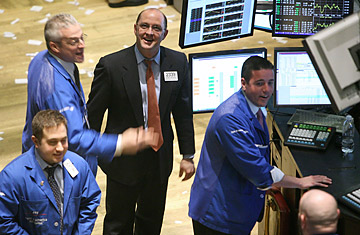
Traders on the floor of the New York Stock Exchange on March 10, 2009
The stock price of the beleaguered financial giant Citigroup jumped 38% today, to a whopping $1.45 per share. Shares are now down only 93% from a year ago.
That sort of context might prove useful for thinking about the day's broader market moves. To be sure, it was a happy one on Wall Street. The Dow Jones industrial average was up 5.8%. The broader S&P 500 index rose 6.4%. The tech-heavy Nasdaq composite gained 7.1%. For investors used to seeing negative signs in front of figures like those, there was cause for celebration indeed. (See the best business deals of 2008.)
But a bear market doesn't end in a day, and anyone who looks at stocks as things to be owned for more than 24 hours probably shouldn't put too much faith in the notion, as pleasant as it might be, that the bottom has been reached.
Consider for a moment why certain stocks rallied. The news that gave Citi — and a bunch of other finance firms — such a boost was that the New York City–based company would be profitable for the months of January and February. Fantastic, but those results exclude asset write-downs (i.e., one of the big reasons the stock takes a beating most other days of the week). Another big gainer: United Technologies. What did the aerospace-equipment and industrial-products maker do to earn an 8.6% boost to its stock price? It said it would lay off 11,600 people. (Read "What to Do If You Get Laid Off.")
And then there were the complete non sequiturs. Casino operator MGM Mirage closed at $2.87, up 23%, on the same day Moody's put it on its "Bottom Rung" list. The members of that list are the companies the ratings agency thinks are the most likely to default on their debt.
That's not to say there wasn't actual good news driving other stocks higher. Nine out of 10 issues on the New York Stock Exchange advanced: some, surely, the start (or continuation) of a long-term upward trend. But should a fabulous day in the market be taken to indicate that a broader market rebound is under way? Probably not. We can hope for that, but in the interest of managing our own expectations, let's not count on it.
